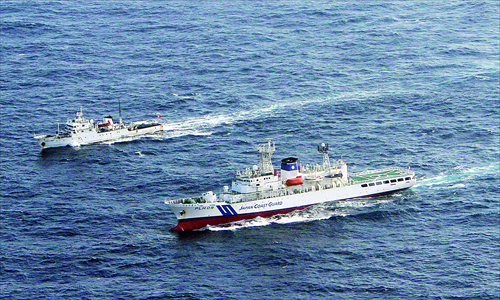China reaffirms sovereignty

China reaffirmed its position on the disputed islands in the East China Sea on Wednesday, denouncing Japan's protest over Chinese fishery patrol ships' entry into waters near the islets in the latest territorial row between the two nations.
Chinese Foreign Minister Yang Jiechi reiterated Wednesday "the Diaoyu Islands and their affiliated islets have always been China's territory since ancient times," while meeting his Japanese counterpart Koichiro Gemba in Phnom Penh on the sidelines of a series of meetings of the Association of Southeast Asian Nations.
He urged Japan to "adhere to relevant agreements and understanding between the two sides in good faith … and take concrete actions to uphold the overall interests of the bilateral ties."
Yang's remarks came as Gemba repeated Japan's protest over three Chinese fishery patrol ships, which approached the Diaoyu Islands at around 2 am on Wednesday.
The law enforcement vessels, the Yuzheng-202, the Yuzheng-204 and the Yuzheng-35001, were conducting routine patrols of the East China Sea, said sources with the East China Sea Fishery Bureau under the Ministry of Agriculture.
The ministry had earlier issued a ban on fishing in the waters from June 1 to protect fish during the spawning season.
The crews of the vessels, which had since left the islands, initially rebuffed Japanese orders to leave.
"We are conducting official duty in Chinese waters. Do not interfere. Leave China's territorial waters," the crew said, according to the Japanese Coast Guard.
Japan's foreign ministry summoned the Chinese ambassador to lodge a protest after the Chinese vessels' actions, Chief Cabinet Secretary Osamu Fujimura told a press briefing, insisting on Japan's claim of sovereignty over the disputed islands.
China's Foreign Ministry spokesperson Liu Weimin made a swift response.
"China's fishery patrol ships entered China-controlled waters in accordance with Chinese laws, undertaking a regular security patrol to strengthen supervision of the summer fishing ban…," Liu told reporters at a press conference.
The latest territorial spat arose just a few days after China lambasted a nationalization plan by the Japanese government.
The Japanese government said on Saturday it was considering a plan to purchase the islands from a private owner in the wake of the nationalist governor of Tokyo's comments regarding purchases of the islands in April.
"It is understandable that China takes actions to demonstrate its sovereignty over the islands, as Japan continues to create disputes with their nationalization plan," Gao Hong, a deputy director of the Institute of Japanese Studies at the Chinese Academy of Social Sciences, told the Global Times.
Geng Xin, a deputy director of the Tokyo-based Japan-China Communication Institute, told the Global Times that the Japanese government may have been intending to ease tensions with the nationalization plan, whereas "such a plan in fact strengthens its control over the islands, risking damage to bilateral ties in a year marking the 40th anniversary of diplomatic normalization between the two countries."
"The resolution of the two nations' rival claims fundamentally lies in diplomatic methods of negotiations and dialogue instead of escalation moves such as the nationalization plan," Gao noted. "The Japanese government should avoid plunging ties between the two nations into a deep standoff to impact bilateral economic cooperation and our peoples' friendship."
The Japanese government was also seemingly aware of the significance of bilateral ties despite lodging the protest. "It is important to respond calmly so that Japan-China relations overall are not affected," Gemba told reporters after his talks with Yang, as quoted by the Kyodo News.
Experts also dismissed allegations that the Chinese navy's six-day drills near Zhoushan, East China's Zhejiang Province which kicked off on Tuesday were aimed at deterring Japan over the Diaoyu Islands dispute.
"It is a routine drill, which is not near the disputed islands," said Gao.
Agencies contributed to this story
Related reports:
Chinese navy holds live-fire drill in E.China Sea
The Chinese navy is to conduct a six-day live ammunition drill in the East China Sea starting on July 10.
Diaoyu Islands can't be 'bought': FM spokesman
China's holy territory is not allowed "to be purchased" by anyone, a Foreign Ministry spokesman said on July 7.
Taiwan backs Diaoyu activists as mainland urges Japanese restraint
China has urged Japan not to take any action that could endanger the safety of Chinese lives and property following a Taiwanese vessel's entry to waters near the Diaoyu Islands, a Foreign Ministry spokesman said on June 4.
Majority want nation to strengthen sea power: survey
China has been speeding up construction of deep-sea oil drilling platforms and expects to be capable of reaching more energy resources lying under the South China Sea as soon as this fall.